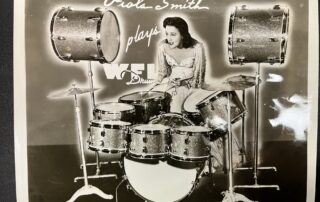On a spring Saturday morning, the classrooms at Milwaukee Arts High School are locked, the corridors dark and silent. There is, however, one exception: the building’s band room.
For a few hours each week, the room fills with the sounds of gospel music courtesy of a group called the Amazing Grace Chorus.
“These guys are amazing,” said Vanta Jones, a Milwaukee music teacher and performer. “For me, this is one of the better groups I’ve ever worked with.”
Jones directs the ensemble, along with veteran musician K.C. Williams.
“We’re just … managing them, but they’re the ones doing all the singing and doing the harmonies and learning the new songs,” said Williams.
The singers in this group come from diverse backgrounds, but they share one common experience: dealing with Alzheimer’s disease or other forms of dementia and memory loss. Some singers have experienced memory loss themselves, while others come with loved ones who have.
“What got me here is Alzheimer’s,” said James McKinley, who attends with his wife Ella.
Singer Catherine Vance remembers when she first experienced memory loss.
“It was my granddaughter’s concert in Mississippi, and I was looking forward to that concert, but it’s just that I don’t remember getting up, getting ready, going to that concert,” Vance said. “In the afternoon I woke up, and I said ‘How did I get these clothes on?’”
In 2014, the Wisconsin Alzheimer’s Institute was approached by psychiatry researcher Dr. Mary Mittelman, who had developed a chorus for people with Alzheimer’s in New York, according to Wisconsin Alzheimer’s Institute outreach specialist Stephanie Houston.
“There is some early research evidence in regards to the impact of music, music therapies and how they affect the brain,” Houston said. “What has been discovered so far is how music has the ability to actually affect the various parts of the brainwaves in such a way that it has the ability to create responses where people can have … emotional memories.”
Along with the potential benefits of music for people with Alzheimer’s, the Alzheimer’s Institute was also interested in reducing negative attitudes toward memory loss, particularly among African Americans.
“This project … is a way to help reduce the stigma associated with memory loss,” Houston said. “Within the African American community, we have higher rates of what is called Vascular Dimentia, and that can be related to people that have had multiple mini-strokes. So because we have issues with high blood pressure, diabetes and high cholesterol, it puts us at greater risk for vascular dimentia.”
In 2014, the institute launched the choir under the direction of Jones and Williams. Their assignment was not easy.
“They didn’t know us so they didn’t really take to us at first,” Jones said. “About the fifth week, we were all family.”
“When they came in, we did not know how talented they were,” Williams said. “We just threw out a few songs and these people start singing in harmony, and we’re like ‘Oh, we’re going to love this.’”
As the choir progressed, family members who accompanied singers with Alzheimer’s noticed subtle changes.
Ella McKinley remembers hearing her husband sing a solo.
“He sang Precious Lord, Take my Hand a few weeks ago, and I just choked up because I hadn’t heard him sing all the way through like that in key and everything,” Ella McKinley said.
Rhulene Artis noticed a change in her mother, Lonnie Ward.
“One day during the winter, I came with mom and it was very cold and we were running late … I got frustrated, said I really shouldn’t have brought her, should have stayed home,” Rhulene said. “So finally we got parked … and before I got her coat off she was singing. I said ‘Good, I did the right thing to bring her.’”
“It’s like, when they start singing, the disease is gone,” director Williams said.
While brain science may explain some of that improvement, members of the choir believe there are other factors too, including the community they find singing together.
“Every time we see each other, it’s just a great feeling to say ‘Hey, it’s great to be back with the family.’ And that’s exactly what it is,” Williams said. “I think that’s the catalyst that makes this choir work.”
The directors and singers also give credit to the spiritual power of the songs they sing, with lyrics that speak to suffering and trial.
“’I sing because I’m happy.’ I like that,” said singer Pearl Cannon. “You know, it’s like there’s some hope in this song, and that’s the reason why I sing. I can carry on.”
“It’s driven by their spiritual enlightenment, their spiritual guidance,” Williams said. “It’s their spirituality and their connection with God and the songs they sing.”










